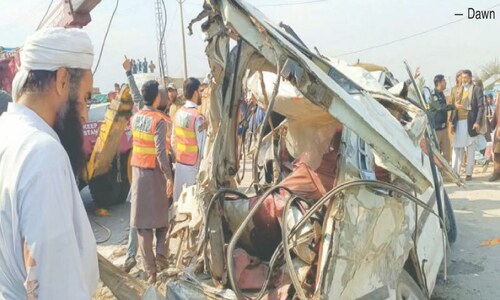PESHAWAR: Farmers in the command area of the Gomal-Zam dam’s irrigation network are expected to experience a range of water and land disputes once the proposed local canal becomes operational.
The construction of the proposed canal will shortly be undertaken with the financial support of the United States Agency for International Development (USAID).
During the course of its completion, the provincial government will need to put in place a new water sharing mechanism in the areas currently dependent on the flood-based Rod Kohi irrigation system.
The provincial government has a huge responsibility to help farmers avoid disputes set to crop up once the centuries old Riwaj based water distribution system becomes redundant after the construction of the canal irrigating parts of southern districts of Tank and Dera Ismail Khan.
Upon completion, the canal will have 316,232 acres feet water annually, irrigating 191,139 acres cultivable land currently dependent on the traditional floodwater based Rod Kohi irrigation system in Tank and Dera Ismail Khan districts.
The Rs12 billion Gomal-Zam dam project is a dual purpose endeavour. Its hydel power generation segment with a 17.4MW generation capacity is complete, while the canal component will be undertaken on the availability of funds for which the federal government is helping Khyber Pakhtunkhwa enter into an agreement with the USAID.The construction of the proposed canal is expected to change dynamics of water distribution in parts of the two districts, where the perennial Rod Kohi (spate irrigation) will be replaced by the canal-based irrigation system.
According to official sources, this will require change in the rules for water distribution. Currently, there are no equitable water rights for farmers dependent on floodwater for meeting their irrigation requirements. An ineffective and loose regime of water rights is practiced from head to tail in the areas drawing irrigation water from Rod Kohi system.
As per the existing practices, farmers at the head of the system irrigate all of their land and then allow farmers at the tail end to use the remaining Rod Kohi water.
Against this system, farmers in the canal-based irrigation system have protected rights and draw water every week from the system in accordance with their decided share.
Small farmers always find themselves at the receiving end under the Rod Kohi water system as the elite and the influential farmers draw the maximum benefit of the available water.
This needs to be taken care of and put in place a proper system before the canal becomes operational.
According to official sources, the water rights as per Kuliat-i-Abpashi (age-old water usage records in the areas under Rod Kohi system) are valid only for the Rod Kohi (spate irrigation) and cannot be practiced once the water distribution takes place following the construction of the proposed canal.
After the canal construction, water distribution will have to be governed by the prevalent Warabandi, a system prevalent elsewhere in the province under which farmers get equitable water in proportion to their share.
Farmers from Tank and the adjacent Dera Ismail Khan district complain that influential farmers with big landholding benefit from the Rod Kohi water more than others.
They are usually facilitated by the local bureaucracy. Financially better off and influential farmers with political clout manage out of turn water flow Water, land disputes over Gomal Zam dam canal likely from the Rod Kohi system. They can even manage water for those tracts of land that don’t have water rights (as per Riwaj/tradition). This usually leads to conflict among the beneficiaries and the deprived.
Though the land related disputes, according to knowledgeable people, are not a common phenomenon in the Rod Kohi based area, this is likely to change after the construction of the proposed canal.
The proposed canal will change the economic complexion of the area in the two districts currently drawing limited water from Rod Kohi. After the canal, the productivity will increase, larger area will come under crops, cropping pattern will change, markets will get strengthened, and a whole lot new economic activity will take place. This will result into disputes among farmers: water distribution and land ownership as well.
At present, the owners of land in the Rod Kohi based area do not usually pay attention to the titles of the land.
They show laxity because the land tends to be of not much value to them. It is not cultivable due to unavailability of irrigation water and it could not sell as well because there are not many buyers.
However, once the irrigation water becomes available, the dynamics will change and the owners will go for protecting their ownership rights. Some might be disappointed due to the laxity they showed to preserve the titles of land received in inheritance.According to officials, with the canal and construction of watercourses, the location of land will become an important attraction for better irrigation input. Conflicts among stakeholders are likely to arise while marking land boundaries to determine the ownership.











































Dear visitor, the comments section is undergoing an overhaul and will return soon.